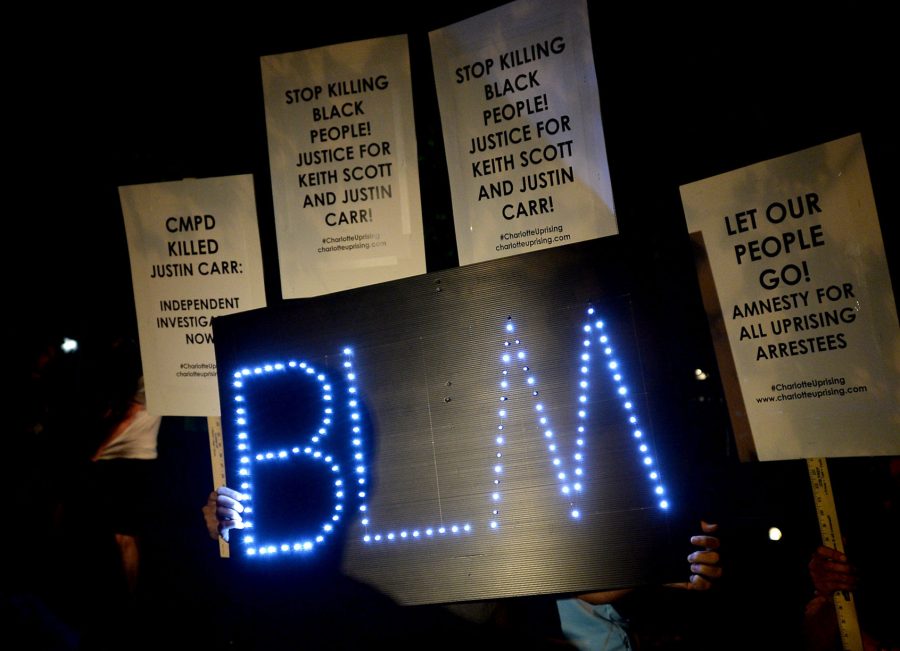World Outside Wilmington: the future of America’s racial tensions
Protesters hold signs during a gathering outside Jail Central in uptown Charlotte, N.C., on Friday, Sept. 30, 2016. (Jeff Siner/Charlotte Observer/TNS)
October 11, 2016
As the nation begins to divert their attention from the Obama Administration to the presidential campaigns of both Hillary Clinton and Donald Trump, citizens are concerned with the stakes of racial tensions in America.
After the formation of Black Lives Matter and the organization of controversial demonstrations by celebrities like Colin Kaepernick, America has experienced increased discussion of the topics of racism, police brutality and discrimination.
The discussion has been so widespread that during the first presidential debate, moderator Lester Holt included a question to the candidates pertaining to their proposed plans on how to “heal the divide” in America.
Clinton, who has based a fair amount of her platform on ensuring racial justice, did not shock many when exhibited a great deal of preparation with her remarks. The Democratic Party, which has always had an overwhelming percentage of minorities, was expected to have a candidate equipped to speak on the topic of race and reach out to the underrepresented voters.
Dedicating an entire portion of her campaign to the matter, Clinton had the opportunity to delve much further into her proposal, as she spoke not only on the surface level issues of racial disparity but also the intersection of other factors playing into inequality.
“[Race] often determines where people live, determines what kind of education in their public schools they can get, and, yes, it determines how they’re treated in the criminal justice system,” said Clinton, according to The Washington Post’s transcripts.
Focusing heavily on policing reforms, Clinton also began to discuss gun control. Ironically, this was a topic that both candidates appeared to agree on. Trump expressed his similar opinion on gun control for one of the first times since his campaign; however, it was only in support of his argument against crime carried out by minorities.
Clinton described her desire to uproot the criminal justice system, calling for reform of many different policies. The school-to-prison pipeline, sentencing laws and abolition of racial profiling by law enforcement are all key factors in her tactics to reform, according to Clinton’s campaign website.
Oppositely, Trump drew closely on the lines of both defining and utilizing racial profiling.
Trump, who has only addressed the issue of race in times of pressing national attention or direct questions in interviews, stated “we need law and order in our country.”
And although Trump has been heavily criticized for his dangerous lack of politically respectful language—or more bluntly put by Clinton, his “racist” language— he still found a way to hurt his outreach to minority voters.
The extent of Trump’s argument to a more vague term of “law and order,” was the amplification of stop and frisk, something that was publicly and federally denounced as racial profiling. And while Trump refused such things and blamed biased judging, Holt reiterated twice that his findings were incorrect.
Aside from denouncing the moderator, who is also a black man, on what is racist and what is not in America, Trump began to flaw his own argument as he began to settle his entire rhetoric in the “decimation” of black communities and illegal immigration.
For the minorities of America, this election will call for the determination of many futures as we continue to strive toward a nation without racism.















